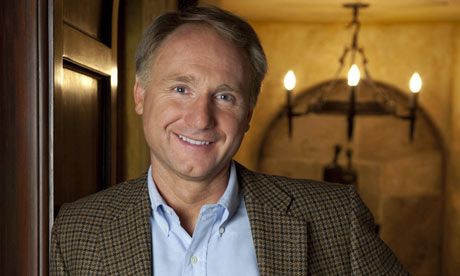
At first, I got swept up in the spirit: there's great fun in being united with other people in common dislike, so when the buzz on Twitter amongst publishing types turned to scoffing at Dan Brown's new opus, my initial instinct was to join in the #danwho? disdain that reached fever pitch on Tuesday with the publication of The Lost Symbol.
I also hated The Da Vinci Code (I threw it against a wall when I finished it) and have more than once felt a wave of revulsion when noting an otherwise perfectly fanciable man reading it on the tube. But as the angst increased, I began to feel uncomfortable with my spot on the bandwagon: should writers and publishers and literary readers reconsider our attitudes towards Brown?
One of the most common complaints of the #danwho? cohort is that the publication and success of Brown's books is undermining to those of greater merit – in other words, pretty much every book out there. But I'm quite sure that this is spurious: the infusion of cash into the industry that comes from Brown's sales, as with other juggernauts like JK Rowling, will have an overall positive effect. Within Random House, increased profits means that there will be more money to punt on writers that are less of a sure thing (as an RH author, this makes me especially optimistic), while increased traffic at booksellers can only help, rather than hinder, the sales of other books. While there may well be people out there who read The Lost Symbol and think, "Ah, well, that was nice. I look forward to reading another book five years from now, or whenever he finishes the next one. Now, where's that old issue of Heat?" but there will also be other people who think, "Hey! Reading a book is fun. Perhaps I shall try another one." I can't hate Dan Brown for making these things happen.
But what swayed my view even more than these economic arguments was in fact, the poignant revelation that Brown shared a creative writing class at Amherst – one of the US's finest small liberal arts colleges – with David Foster Wallace. No one, I am certain, takes a creative writing course with the aim of writing over-wrought, long-winded, critically-reviled thrillers. You take a creative writing course because you want to be a good writer; because you go back to your dorm room and read the great books on your English Lit course syllabus (or your genius classmate David's coursework) and regard the Pulitzer prize shortlist and think, "One day, that could be me." And then you sit down to write with all the best of intentions, and all that comes out is "The thirty-four-year-old initiate gazed down at the human skull cradled in his palms."
Who hasn't been there? I know I have: when writing my first volume of unabashed commercial non-fiction, every so often I found my mind drifting to the entertaining notion that some insightful critic would read it and say, "Ah, this volume of unabashed commercial non-fiction actually has surprising literary merit!" But I know that I will be waiting for ever.
I would thus be willing to wager all of the income I have ever made from writing fiction (nothing, but the sentiment is there) that sometimes, even as he wallows in his piles of money, Dan Brown wonders why he'll never be able to write exactly as well as he wishes he could; why while being one of the world's most financially successful writers, literary acclaim eludes him; why no one ever says, "actually, there's a sentence on page 344 when Langdon says something rather profound and eloquent". Sometimes, despite our best intentions, we just cannot help the way that we write, and sometimes, it is just a bit crap.
Might our communal antipathy towards Brown in fact be a displacement of the energy that fuels the oft-unspoken but pervasive anxiety that the even attainment of longed-for commercial success is no guarantee that we are actually any good at writing? And yet would we keep writing at all if we didn't still have a shred of hope, deep down, that it might be possible that we might be brilliant? We are all Dan Brown. Except for the staggering wealth.

